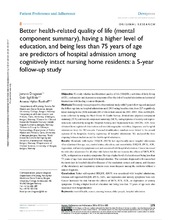| dc.description.abstract | Objective: To study whether health-related quality of life (HRQOL), activities of daily living (ADL), and anxiety and depression symptoms affect the risk of hospital admission and potential interactions with having a cancer diagnosis. Methods: This study was a prospective observational study with 5-year follow-up and analyzed the follow-up data on hospital admissions until 2010 using baseline data from 227 cognitively intact nursing home (NH) residents (60 of whom had cancer) in 2004–2005. Data on HRQOL were collected by using the Short Form-36 Health Survey, divided into physical component summary (PCS) and mental component summary (MCS), and symptoms of anxiety and depression were collected by using the Hospital Anxiety and Depression Scale (HADS). ADL were obtained from registered observation and sociodemographic variables, diagnoses, and hospital admissions from the NH records. Personal identification numbers were linked to the record systems of the hospitals, thereby registering all hospital admissions. We analyzed the time elapsing between inclusion and the first hospital admission. Results: Residents with higher HRQOL (MCS) had significantly more hospital admissions after adjustment for age, sex, marital status, education, and comorbidity. HRQOL (PCS), ADL, depression, and anxiety symptoms were not associated with hospital admissions. Cancer increased the risk after adjustment for all other risk factors but did not increase the effects of MCS, PCS, ADL, or depression or anxiety symptoms. Having a higher level of education and being less than 75 years of age were associated with hospitalization. The residents diagnosed with cancer had the most days in hospital related to diseases of the respiratory system and cancer, and diseases of the circulatory and respiratory systems were more frequent among the residents without a cancer diagnosis. Conclusion: Better self-reported HRQOL (MCS) was associated with hospital admissions, whereas self-reported HRQOL (PCS), ADL, and depression and anxiety symptoms were not. Cancer increased the risk but not the effects of MCS, PCS, ADL, or depression or anxiety symptoms. Having a higher level of education and being less than 75 years of age were also associated with hospitalization. | en_US |

